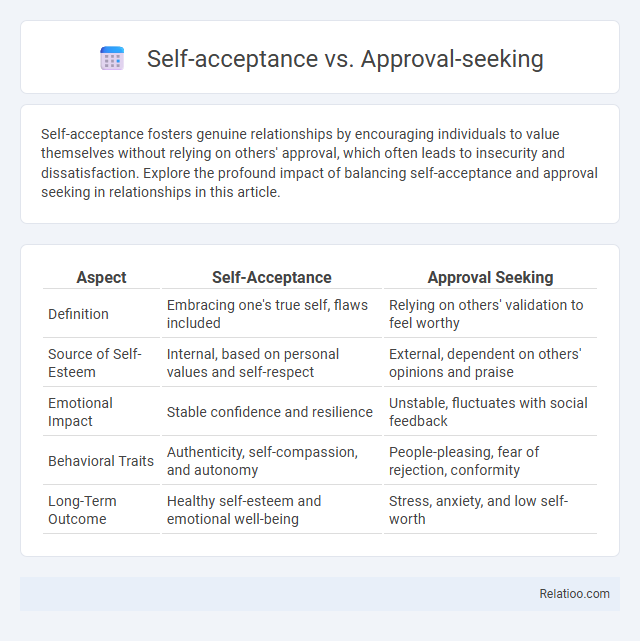Self-acceptance fosters genuine relationships by encouraging individuals to value themselves without relying on others' approval, which often leads to insecurity and dissatisfaction. Explore the profound impact of balancing self-acceptance and approval seeking in relationships in this article.
Table of Comparison
| Aspect | Self-Acceptance | Approval Seeking |
|---|---|---|
| Definition | Embracing one's true self, flaws included | Relying on others' validation to feel worthy |
| Source of Self-Esteem | Internal, based on personal values and self-respect | External, dependent on others' opinions and praise |
| Emotional Impact | Stable confidence and resilience | Unstable, fluctuates with social feedback |
| Behavioral Traits | Authenticity, self-compassion, and autonomy | People-pleasing, fear of rejection, conformity |
| Long-Term Outcome | Healthy self-esteem and emotional well-being | Stress, anxiety, and low self-worth |
Understanding Self-Acceptance: Embracing Your True Self
Understanding self-acceptance involves embracing your true self without relying on external validation or approval seeking, which often leads to emotional dependence. While approval can momentarily boost confidence, genuine self-worth stems from recognizing and valuing your authentic qualities and imperfections. Cultivating self-acceptance helps you build resilience against societal pressures and fosters inner peace.
The Roots of Approval Seeking Behavior
Approval seeking behavior often stems from early emotional experiences where love and acceptance were conditional. Your need for external validation can be traced back to childhood environments that prioritized approval over intrinsic worth, leading to a dependence on others' opinions for self-esteem. Cultivating self-acceptance helps break this cycle by fostering internal validation and reducing the influence of approval seeking on your well-being.
Key Differences Between Self-Acceptance and Seeking Approval
Self-acceptance involves embracing one's true self, including strengths and weaknesses, while approval seeking depends on external validation and approval from others. Unlike approval seeking, self-acceptance fosters intrinsic motivation and emotional resilience by prioritizing inner values over social approval. Key differences highlight that self-acceptance builds sustainable self-esteem, whereas approval seeking often leads to dependency and fluctuating confidence based on external opinions.
Psychological Impacts of Seeking External Validation
Seeking external approval often leads to diminished self-esteem and increased anxiety, as your sense of worth becomes dependent on others' opinions rather than internal values. Self-acceptance fosters emotional resilience by promoting a stable self-image independent of external judgment, reducing vulnerability to social pressures. Chronic approval seeking can cause psychological distress, including feelings of inadequacy and decreased life satisfaction.
Barriers to Achieving Self-Acceptance
Barriers to achieving self-acceptance often stem from the habitual need for approval seeking, which shifts focus away from your internal values to external validation. Constantly measuring yourself against others' approval creates a cycle of dissatisfaction that hinders recognizing your intrinsic worth. Overcoming these obstacles requires redefining self-worth independently of approval, fostering authentic self-compassion and resilience.
Social Media and the Rise of Approval Seeking
Social media platforms have amplified the rise of approval seeking by creating environments where likes, comments, and shares serve as metrics of social validation. You may find that constantly measuring self-worth against online approval undermines genuine self-acceptance, leading to decreased mental well-being and increased anxiety. Developing self-acceptance involves prioritizing intrinsic values over external validation in the digital age dominated by approval-driven interactions.
Benefits of Cultivating Self-Acceptance
Cultivating self-acceptance fosters emotional resilience and reduces dependence on external approval, leading to greater mental well-being and authentic relationships. Unlike approval seeking, which can result in anxiety and compromised values, self-acceptance enhances intrinsic motivation and self-esteem. This mindset supports healthier decision-making and sustained personal growth by valuing one's unique qualities over societal validation.
Signs You May Be Stuck in Approval Seeking Patterns
Constantly adjusting your behavior to gain others' approval often signals approval seeking patterns, which can hinder genuine self-acceptance. Signs include excessive worry about others' opinions, difficulty making decisions without validation, and an ongoing need for external praise. This reliance on external validation undermines authentic self-esteem and perpetuates emotional dependency.
Strategies to Shift from Approval Seeking to Self-Acceptance
Shifting from approval seeking to self-acceptance involves cultivating intrinsic validation and mindfulness practices that reinforce personal values over external opinions. Techniques such as cognitive reframing, setting clear personal boundaries, and engaging in self-compassion exercises are effective in reducing dependency on others' approval. Building a consistent self-reflective routine and embracing emotional awareness further strengthen the ability to internalize self-worth and foster authentic confidence.
Building a Lifestyle Rooted in Authenticity
Building a lifestyle rooted in authenticity requires prioritizing self-acceptance over seeking external approval, as true confidence comes from valuing your intrinsic worth rather than relying on others' validation. Approval seeking can lead to inconsistency and emotional dependence, undermining your genuine identity and happiness. Embracing self-acceptance fosters resilience, enabling you to live authentically and create a fulfilling life aligned with your personal values.

Infographic: Self-acceptance vs Approval seeking
 relatioo.com
relatioo.com